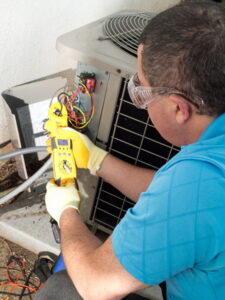
One of the more common air conditioning system malfunctions that our technicians repair is refrigerant leaks. Leaks most frequently occur in AC systems older than five years. This is because the copper refrigerant lines may start to corrode after this period due to exposure to formaldehyde in the air. A small spot from formicary corrosion (a type of corrosion that affects copper) will allow pinhole leaks to start in the lines and allow refrigerant to escape.
This may sound like a minor problem. It’s not! Refrigerant leaks will put your air conditioning system in jeopardy of failure and the possible need to replace the entire AC. We’ll explain more about the danger of refrigerant leaks and how to know when it’s time to call us for air conditioning repair in Conyers, GA.
What Refrigerant Does
Many people misunderstand the purpose of refrigerant, thinking that it’s the source of the “cold” pushed into the house (or into a freezer or refrigerator) or that it’s a type of fuel. Neither is true.
Refrigerant doesn’t create cold, which isn’t even a form of energy; it removes heat through evaporation and then moves the heat outdoors and releases it there through condensation. Refrigerant doesn’t power the AC like fuel, that’s the job of electricity. The refrigerant in an air conditioner does not get “used up” as the AC runs like an energy source. Instead, it continually shifts between gaseous and refrigerant forms in a closed loop.
Unless the air conditioning system develops refrigerant leaks, the same amount of refrigerant will stay in the system for its full service life. This amount is known as the air conditioner’s charge.
The Danger of Leaking Refrigerant
Because an AC is designed to work with a specific refrigerant charge (which technicians will put into the system when it’s installed), it will start to lose energy efficiency and cooling effectiveness if the charge drops. That, however, isn’t the worst part.
Losing refrigerant in an air conditioner changes the pressure throughout the system, and this leads to damage. The compressor is the most vulnerable to refrigerant loss. If the charge drops low enough, the compressor will overheat and burn out. A burnt-out compressor is an expensive replacement, and if an AC is no longer under warranty, it’s best to simply get a new air conditioner at that point.
How to Detect and Prevent Refrigerant Leaks
The best way to prevent refrigerant leaks is always to have professionals inspect and tune-up your air conditioning system each spring. This regular maintenance gives HVAC pros a chance to catch signs of corrosion. They can also detect leaks early by checking the refrigerant pressure.
To detect leaks, look for the following warning signs:
- An increase in indoor humidity
- Ice forming along the evaporator coil
- A hissing or gurgling sound from the AC
- The AC short-cycling
- The AC tripping its circuit breaker multiple times
These could all point to other problems aside from refrigerant leaks, but you’ll want those dealt with as well. Never hesitate to call our team for AC repairs—the sooner we’re on the job, the better off your cooling system will be.
Experience the Premier Difference! Premier Heating & Air has been family-owned and operated since 2001.

